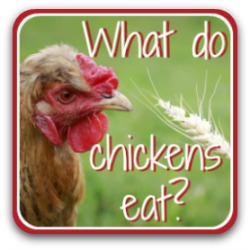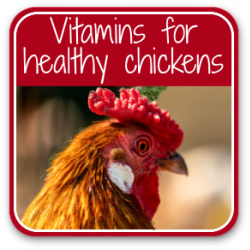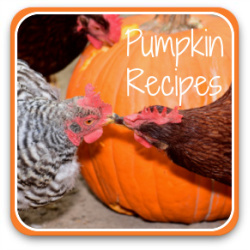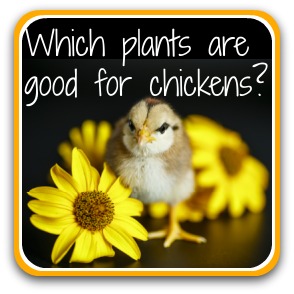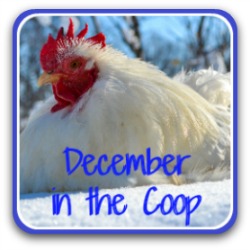What can a chicken eat when food (or money) is scarce?
Ideally, chickens should eat a diet well balanced in protein, vitamins and minerals. But what if you have to cut down on costs?
Links on the rest of this page are "affiliate links". If you click on them and buy, I earn a small commission at no cost to you. I only recommend products I know and love and which I think will be genuinely useful to you. See my disclosure policy for more information.
There might be any number of reasons: perhaps you didn't realise beforehand how much chickens can cost to keep.
Or maybe the money you banked on when you started your flock has suddenly dried up and you need to considerably reduce your budget .
What then?
This article is about how chickens can be fed when your usual store of commercial food dries up, or when you need to bulk it up because your budget has reduced.
It's not ideal, but for a limited time these tips will keep them relatively fit and healthy.
Firstly, keep your chicken food secure.
Keeping expensive grain in containers which are easily accessed by wild birds and rodents means you're spending money feeding animals and birds you'd rather not have in your coop in the first place.
Why? Because birds can transmit bird flu; rats spread disease and will eat your chickens' eggs. And because they will, if they can, eat a large amount of your feed. And rats can get into the smallest of spaces.
Do you really want to spend your money feeding rats?
So before anything else, make sure your storage bins and feeders are feeding your chickens only. If you can, invest in a well made treadle feeder. They're not cheap to buy, but believe me, they save a lot of money in the long term.
See my review of the one I consider to be the best automatic feeder, here.
Chicken food for free ranging flocks.
If your chickens can safely be allowed access to pasture, even if that's just a small garden, your problems are less severe. Foraging for food is an instinctive behaviour. If left to their own devices, chickens will find their food in the unlikeliest of places.
 Foraging: an instinctive behaviour which increases your chickens' health and their eggs' nutritional value!
Foraging: an instinctive behaviour which increases your chickens' health and their eggs' nutritional value!There's a distinct benefit of foraging, rather than feeding only grain: you'll discover that your chickens love meat. Not in the sense of a steak, but in the shape of bugs. Worms, grasshoppers, beetles, spiders, termites, ticks - more or less any bug that moves.
So they'll clear your garden of some unwanted pests.
Not only that, but they love finding mice and (one of my flock's particular favourites) frogs. It can be pretty gross, and it surprises a lot of people, but the fact is chickens are not vegetarians. Left to their own devices, they will choose a varied diet full of protein.
Because of that variation in diet, eggs from pastured hens are proven to contain nearly twice as much vitamin E and Omega-3 than those fed on grain only(1, 2).
So by allowing your hens to forage, you're also improving the nutritional value of their eggs for your family.
Win - win!
Weeds.
Free ranging isn't always possible, though - I've lost chickens to predators that way. In which case, we have to do a spot of gardening to help our hens get by.
Weeds are free, and regarded by many gardeners as a nuisance. But for our chickens, they can be an important source of healthy food.
 Chickens love weeds - and they're full of nutrition!
Chickens love weeds - and they're full of nutrition!Dandelions, clover, chickweed, nettles - all those plants and more can provide your chickens with a free, nutritious food source.
For information about which weeds are specially good for chickens, take a look at my detailed article, here.
Not got any weeds of your own?
Offer to weed a neighbour's vegetable garden, or clear that patch of nettles for them. They'll bite your hand off (and so will your chickens!).
Grow your own.
It's always good to be prepared, and growing your own source of chicken food has benefits whether you also have commercially prepared feed or not.
It's a very inexpensive way of providing your chickens with some very valuable food - and it's fun!
Lettuce is a staple: it grows all year round, is very quick from seed to eat, and even the least green-fingered gardener can grow it. I use two troughs and re-seed one as I use the other. Packed with minerals like potassium and calcium, and vitamins, particularly C and K, it's a no-brainer as a healthy, low fat chicken food.
Tomatoes: although the vine is poisonous for chickens, the tomato itself is fine for them to eat - and in my experience, they love particularly over-ripe tomatoes.
 Try growing a tumbling variety - they're easier to care for than uprights and take less space.
Try growing a tumbling variety - they're easier to care for than uprights and take less space.Very easy to germinate, try a variety like "Tumbling Tom" which can grow from hanging baskets, so are ideal for both rural and urban areas, no matter how small. I grow a couple just outside my chicken run so it's easy to harvest some every time I go in.
And as an extra benefit, as well as containing vitamins and minerals your flock needs, tomatoes contain lycopene, an important anti-oxidant.
Sunflower seeds: As I live in Italy, my list wouldn't be complete without growing sunflowers! They're all around me in fields, but they're also really easy to grow in pots and there are dwarf as well as giant varieties. And of course, kids love watching the big ones grow bigger than they are!
My article about growing and harvesting sunflower seeds for chickens will provide all the details you need to know.
Pumpkins: Another easy-to-grow food with mega-benefits in terms of nutrition. See this article for detailed information and this one for two simple pumpkin recipes.
Sprouting seeds: If you've got lentils in your store cupboard, you'll have a source of low cost, high value chicken food for weeks!
 Sometimes my chickens look at sprouted lentils as though to say "Where are the mealworms?"!
Sometimes my chickens look at sprouted lentils as though to say "Where are the mealworms?"!It's ultra-easy to do, takes only a few days to get a crop enough for a flock, and is really, really inexpensive.
For more information take a look at my page on why sprouting seeds make for happy chickens!
Or take a look at my warm recipe based on the health benefits of lentils.
Garlic: Not a food in itself, of course, but providing your hens with some garlic will make sure their immune system is kept well charged. It's also been proven to protect against some viruses and to increase egg production.
Find out more in my article about the benefits of feeding garlic to chickens.
Grow your own - mealworms!
Mealworms are a wonderful source of protein for chickens. I buy them dried because I'm not sure I could deal with the grossness of growing my own...
But that's an expensive way of doing it.
If you can bear the thought, consider starting your own mealworm farm. Once you've set it up it can be more or less a continuous supply for very little work.
This is a helpful video about how to get started.
Fermenting chicken food.
Fermenting food for chickens is a great way to both bulk it out, and to add huge nutritional value. There's a lot of peer-reviewed evidence that fermenting food for poultry not only makes it more digestible, but multiplies vitamin content and adds a layer of protection from infection(3).
And not only is the feed increased by weight and volume, chickens tend to eat less of it because the food is absorbed more efficiently.
For more information about the benefits of fermenting chicken food, take a look at my article here.
For step-by-step instructions about how to ferment chicken feed, this is the article you want.
 Heads moving at the speed of light! My chickens can't wait to get their beaks into fermented food!
Heads moving at the speed of light! My chickens can't wait to get their beaks into fermented food!Kitchen scraps.
This is a controversial one.
I have to make the point that in the UK, the Department for Food and Rural Affairs (DEFRA) specifies that it is not permitted to feed anything that's been through your kitchen to your chickens. Not only is it not permitted - it's illegal. This also applies to any EU country.
For an explanation of reasons, which are related to preventing the introduction and spread of disease, and more information, see this article.
And before anyone says "my grandparents only ever fed kitchen scraps to their chickens" - poultry these days, which have often been bred to produce a much larger number of eggs than chickens would ever have laid previously, or indeed in the wild, need greater sustenance.
Not to mention the fact that in days gone by, the spread of disease was more limited. Life was just more "natural" then.
If you do choose to give your chickens some of the food that you have left over, please bear in mind that not everything humans eat is good for chickens.
 Bread is fine as an occasional food but not as a staple.
Bread is fine as an occasional food but not as a staple.Take-away, processed and fast foods, which tend to be massively high in salt, sugar and fats, must be avoided. You stand to do your chickens more harm than good by feeding them these foods. Yes, they might gobble them down - but like children, chickens don't always know what's best for them!
Even scraps you might feel are harmless, like bread, can contain high levels of sodium. And chocolate can be a killer - keep it for yourself!
The best scraps are left over vegetables and over-ripe fruit. Mine also love pasta and rice, but feed carbohydrates in moderation.
To make the best of kitchen scraps, keep a small bucket in your kitchen and add suitable food to it. Feed daily so it doesn't go mouldy.
I use this little bin which I keep on my counter-top - it can be mounted inside a cupboard if you prefer. I did have a metal one, which looked pretty but rusted really quickly. This is very easy to clean, and because it has no corners food never gets stuck.
Please remember, feeding chickens a properly balanced food is best for their overall health. Feeding other foods as treats is fine, but in normal circumstances should make up no more than 10% of their daily feed.
Only in the most unusual of circumstances should your flock's diet consist of nothing but the foods I talk about here.
More information about what chickens eat.
Sources.
A lot of "facts" you'll find on the internet are often people's individual views, based on inaccurate information repeated from poor quality sources.
The information I provide in this article and others is based not just on my own experience, but on evidenced facts from scientific, peer-reviewed research and books from highly respected and experienced poultry keepers such as Gail Damerow.
Some of the trusted sources I have used in this article are these.
1. Karsten, H. D. et al: Vitamins A, E and fatty acid composition of the eggs of caged hens and pastured hens. Pub. Renewable Agriculture and Food Systems, 2010.
2. Lopez-Bote et al: Effect of free-range feeding on n-3 fatty acid and a-tocopherol content and oxidative stability of eggs. Pub. Animal Feed Science and Technology, 1998.
3. Engberg et al : 'Fermented feed for laying hens: effects on egg production, egg quality, plumage condition and composition and activity of the intestinal microflora'. Pub U.S. National Library of Medicine, 2009.


